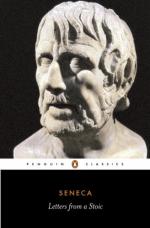|
This section contains 857 words (approx. 3 pages at 400 words per page) |

|
Perspective
Seneca's philosophical work exhibits a careful balance of his two identities: first, a member of Roman high society and, second, as a philosopher. In Roman society, appearances were everything. One had to obey all of the prescribed customs and the notion of honor permeated everything. It is important to realize however that acting honorably did not always mean acting morally. In fact, sometimes it was quite the opposite. Some philosophers had even distinguished "noble" and "ignoble" vices. An honorable man might be proud, for example, but he would never be a drunkard.
On the other side is the world of philosophy. For the most part, Romans associated philosophy with the Greeks, and the association was not a pleasant one. The Greek philosophers had a (more or less deserved) reputation for being strange, unkempt, counter-cultural troublemakers. Disobeying social customs was a fundamental belief of many of the philosophical schools...
|
This section contains 857 words (approx. 3 pages at 400 words per page) |

|




